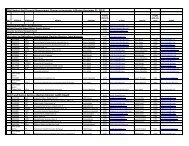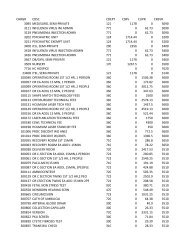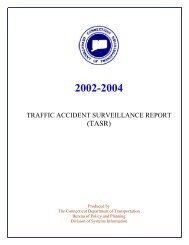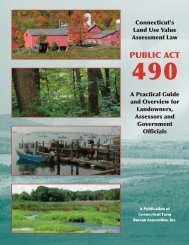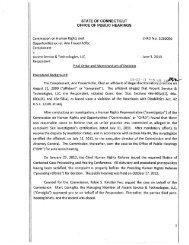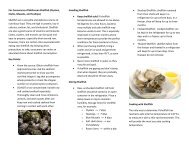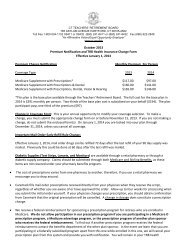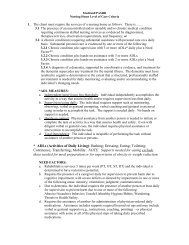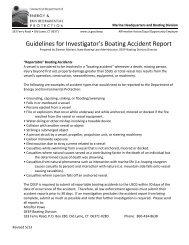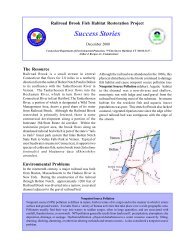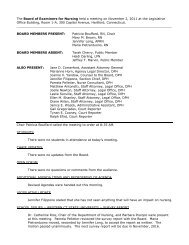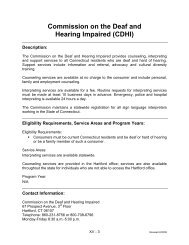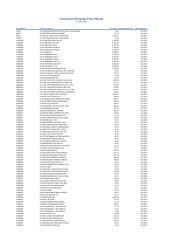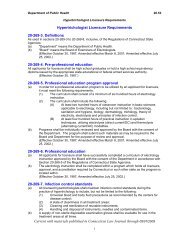2013 CT Anglers Guide - CT.gov
2013 CT Anglers Guide - CT.gov
2013 CT Anglers Guide - CT.gov
Create successful ePaper yourself
Turn your PDF publications into a flip-book with our unique Google optimized e-Paper software.
Group Fishing Licenses<br />
Group Fishing Licenses<br />
Now available to qualified 501(c)(3) organizations wishing to<br />
conduct group fishing programs and events for:<br />
• Veterans with a service-related or other disability who receive<br />
services at a U. S. Department of Veterans Affairs Connecticut<br />
Healthcare System facility;<br />
• Persons who receives mental health or addiction services<br />
from the Department of Mental Health and Addiction Services<br />
(DMHAS), DMHAS programs or facilities, or psychiatric hospitals<br />
operated at least in part by DMHAS;<br />
• Individuals with autism or intellectual disabilities who receive<br />
services from the Department of Developmental Services (DDS)<br />
or a facility licensed by DDS; or<br />
• Persons receiving care from the Department of Children and<br />
Families (DCF), DCF receiving homes, or certain DCF-licensed<br />
child care facilities or programs.<br />
Qualified tax-exempt organizations can apply for a Group Fishing<br />
License ($250.00 annual fee). Holders of this license may hold up to<br />
50 events per year, including both inland and marine water events.<br />
Each event is limited to 50 people. The events must be supervised<br />
by organization staff or volunteers. Supervising staff and volunteers<br />
must have fishing licenses. The organization may not charge a fee<br />
to participate and the events may not be used as a fundraiser.<br />
Contact DEEP Inland Fisheries (phone: 860-424-3474, email:<br />
dep.inland.fisheries@ct.<strong>gov</strong>) for more information and application<br />
forms.<br />
The official bimonthly magazine of the<br />
Department of Energy & Environmental<br />
Protection’s Bureau of Natural Resources<br />
For $8.00 a year, you can receive our award-winning magazine!<br />
Fill out a subscription card today.<br />
Subscribe today to Connecticut Wildlife, the Department<br />
of Energy & Environmental Protection’s official<br />
bimonthly fish and wildlife publication.<br />
SUBSCRIPTION CARD<br />
❒ $8 One Year ❒ $15 Two Years ❒ $20 Three Years<br />
❒ Renewal ❒ New Subscription ❒ Gift Subscription<br />
Please make checks payable to:<br />
Connecticut Wildlife, P.O. Box 1550, Burlington, <strong>CT</strong> 06013-1550<br />
Name: ________________________________________________<br />
Address: ______________________________________________<br />
City: _________________________________________________<br />
State: _________________ Zip: ___________________________<br />
Gift card to read: _______________________________________<br />
Looking to GET THE LEAD OUT?<br />
Lead is a metal which, in sufficient quantities, can negatively affect the nervous and reproductive systems<br />
of animals and humans. Most fishing jigs and sinkers have historically been made with lead.<br />
Wildlife such as eagles, loons, and other waterfowl can be poisoned by<br />
lead they’ve consumed. Hooked fish can ingest or retain attached lead<br />
fishing tackle such as hooks and jigs, and become a potential pathway<br />
of lead exposure for predatory birds consuming fish containing such<br />
lead fishing gear. In addition, lost or discarded lead fishing weights and<br />
other lead fishing tackle of smaller sizes can be ingested by wildlife,<br />
particularly dabbling and diving water birds such as such as swans,<br />
ducks, geese and loons.<br />
There are alternatives to lead, made from non-poisonous materials<br />
such as tin, bismuth, steel, tungsten and glass that are available at<br />
established sporting goods retailers and on the internet. These will be<br />
more expensive than lead, but will be more environmentally benign,<br />
and as demand continues to grow, prices are expected to drop.<br />
Consider asking for non-lead alternatives when purchasing new tackle<br />
or replacing old.<br />
Websites for more information on lead sinkers include:<br />
• Minnesota Pollution Control Agency: www.pca.state.mn.us/sinkers<br />
• US EPA: http://water.epa.<strong>gov</strong>/scitech/swguidance/fishshellfish/animals.cfm<br />
• NY DEC: http://www.dec.ny.<strong>gov</strong>/outdoor/7908.html<br />
Image courtesy of <strong>CT</strong> DEEP Wildlife — Paul Fusco<br />
32 <strong>2013</strong> Connecticut Angler’s <strong>Guide</strong>



